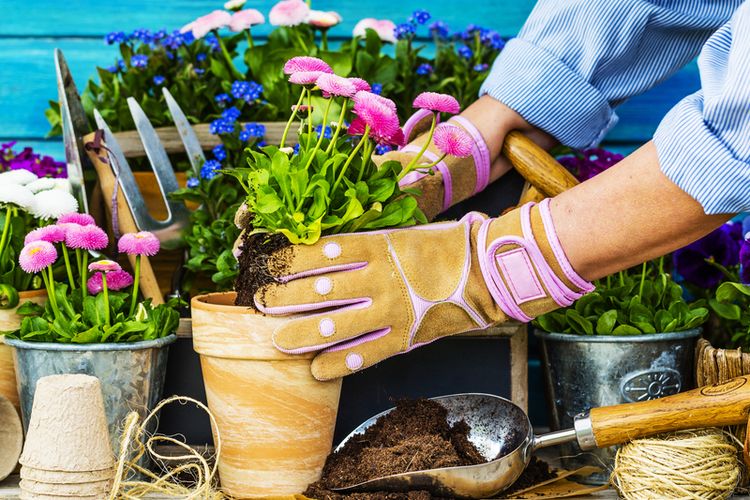See, 5 Benefits of Caring for Ornamental Plants for Health
JAKARTA, KOMPAS.com – Caring for ornamental plants is a very popular trend in 2020, in line with the spread of the corona virus. To reduce the spread of the virus, people are encouraged to do activities at home.
Due to the large amount of time spent at home, time for caring for ornamental plants is available. This trend is also believed to continue in 2021.
Caring for ornamental plants is not only to beautify home decorations. In fact, caring for ornamental plants or placing houseplants indoors has many health benefits.
Also read: 5 Ideas for Putting Ornamental Plants in the House
Reporting from Treehugger, Sunday (14/2/2021), here are 5 benefits of caring for ornamental plants for health.
1. Helps breathe
When we breathe, we carry oxygen into the body, exhaling releases carbon dioxide. During photosynthesis, plants do the opposite.
Plants absorb carbon dioxide and release oxygen, making plants and humans great partners when it comes to air. Plants help increase oxygen levels, and our bodies appreciate it.
However, when photosynthesis stops at night, most plants absorb oxygen and release carbon dioxide. However, some plants, such as orchids, succulents, and bromeliads absorb carbon dioxide and release oxygen.
Also read: 6 Indoor Ornamental Plants that are Easy to Care for, Suitable for Beginners
That is, put this plant in the bedroom to keep oxygen flowing at night.
2. Helps prevent disease
In nature, plant roots tap the surface of groundwater in search of water which then evaporates through their leaves in a process known as transpiration. Research shows that it accounts for about 10 percent of the humidity in the atmosphere.
The same thing happens at home, where plants are able to increase the humidity in the room.
A study at the Norwegian Agricultural University found that keeping plants indoors reduced the incidence of dry skin, colds, sore throats and dry coughs.
Other studies have revealed that higher absolute humidity is conducive to decreased survival and disease transmission.
 Illustration of caring for ornamental plants, potted plants.
Illustration of caring for ornamental plants, potted plants. 3. Clean the air
NASA has spent a great deal of time researching air quality in closed environments. Extensive research by the US space agency uncovered a new concept in improving indoor air quality, in which plants play an important role.
“The leaves and roots of the plant are used to remove trace levels of toxic air from inside tightly closed buildings. Low-level chemicals such as carbon monoxide and formaldehyde can be removed from indoors,” NASA said in its report.
When talking about the relationship between plants and space explorers, NASA states that plants, provide nutrients to the body when eaten and improve indoor air quality.
Also read: 7 Ornamental Plants That Can Refresh the Air in the Bedroom
Plants absorb carbon dioxide from the air to produce oxygen that humans can breathe.
Some of the best plants for removing indoor pollutants according to NASA are as follows.
- Pothos or ivory betel (Scindapsus aureus)
- English ivy (Hedera helix)
- Chrysanthemum (Chrysanthemum morifolium)
- Gerbera daisy (Gerbera jamesonii)
- Bamboo palm tree (Chamaedorea seifrizii)
- Dracaena red edge (Dracaena marginata)
4. Promotes healing
It may be common to bring flowers or plants to visit patients in the hospital, but plants are considered effective in helping surgery patients recover.
In fact, one study recommends it as a “noninvasive, inexpensive, and effective complementary drug for surgical patients.”
Also read: Don’t choose the wrong choice, these 10 ornamental plants need high maintenance
The study, conducted at Kansas State University, found that looking at plants during recovery from surgery led to a significant increase in physiological responses.
This is evidenced by lower systolic blood pressure, and lower levels of pain, anxiety, and fatigue compared to patients without the plant. in their room.
Another technique to reduce recovery time is horticultural therapy, where the patient is given the task of caring for plants. Patients who physically interacted with the plant experienced a significant reduction in recovery time after medical procedures.
5. Increase work productivity
A number of studies have found that studying or working with plants can have quite dramatic effects. Like being in nature, being around plants increases concentration, memory, and productivity.
Also read: 5 Ornamental Plants That Are Believed To Bring Hockey This Year
Meanwhile, two studies conducted in Norway found that worker productivity was greatly increased with the presence of plants in the office.
“Taking care of houseplants at home and at work improves memory retention and concentration. Work done under the natural influence of houseplants is usually of a higher quality and completed with a much higher degree of accuracy than work done in a plant-free environment, “says Texas A&M Extension.